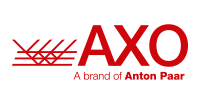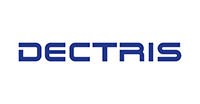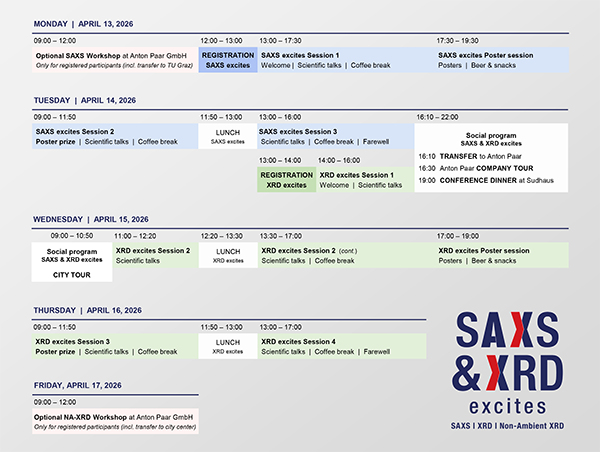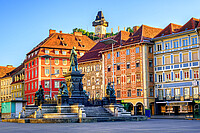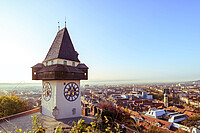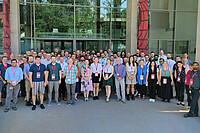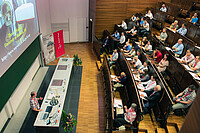SAXS excites & XRD excites 2026
International SAXS and XRD symposia 2026
Event Dates
SAXS excites: April 13-14, 2026
XRD excites: April 14-16, 2026
Event Location
Graz University of Technology
The event is hosted by Graz University of Technology and Anton Paar
Workshop Dates
SAXS Workshop: April 13, 2026
Non-Ambient XRD Workshop: April 17, 2026
The workshops take place at Anton Paar
Welcome to the Exciting World of SAXS and XRD
Background
At the SAXS excites & XRD excites symposia, to be held in the form of consecutive meetings from April 13-16, 2026, in the wonderful Austrian city of Graz, we’ll be discussing the latest advances in the fields of SAXS, powder XRD, and non-ambient XRD.
Join renowned experts, young researchers, and opinion leaders from the field of X-ray analysis at this exciting event.
- Enhance your knowledge of small-angle X‑ray scattering by attending the optional SAXS workshop prior to the symposia on April 13.
- Deepen your understanding of non-ambient XRD by attending the optional NA‑XRD workshop after the symposia on April 17.
Why Attend?
- Join the discussion on topics related to SAXS and XRD with internationally recognized scientists, young researchers, and other participants from complementary fields.
- Present your own research and ideas to international participants from a broad range of backgrounds.
- Learn about key research topics pushing the boundaries of SAXS and XRD and how they relate to complementary methods and new application fields.
- Join networks, broaden your horizon, and discuss the future of X-ray structure analysis methods during the scientific sessions and while exploring the beautiful historical city center of Graz. And enjoy unique regional cuisine prepared by the award-winning chefs at the Sudhaus.
Symposia Program
The symposia will consist of several themed sessions with keynote speakers, contributed talks, and poster sessions with poster prizes.
Key themes
- SAXS/WAXS/RheoSAXS/USAXS for the study of nanostructured materials
- GISAXS/GIXRD/XRR for thin film and surface diffraction/scattering
- Operando / in situ analysis using X-ray scattering for battery research
- XRD and non-ambient XRD methods and applications
- Total scattering and PDF analysis of disordered and amorphous materials
Best poster award
We will recognize the best poster presentations with award certificates and prize money of 250 €.
Social program
Participants can attend a guided walking tour of Graz’s old city center – a UNESCO heritage site – in addition to a tour of Anton Paar headquarters. A conference dinner for all attendees will be hosted at the Sudhaus, Anton Paar’s award-winning restaurant and brewery located on the company premises, which serves local delicacies alongside a selection of craft beers.
Keynote Speakers
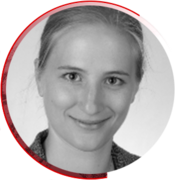
Eva M. Herzig
University of Bayreuth, Germany
Professor Eva M. Herzig has been Professor of Experimental Physics – Dynamics and Structure Formation at the University of Bayreuth since 2017. She studied physics at the University of Edinburgh, where she also earned her PhD in soft condensed matter. After positions in industry and as a group leader at the Technical University of Munich, she established her own research group in nanostructural characterization, organic photovoltaics, and functional thin films.
Her research focuses on the processing and nanostructure control of thin films, with a particular focus on X-ray scattering techniques to understand structure–function relationships in organic semiconductors and energy materials. In 2024, she was appointed Adjunct Associate Professor at Monash University, Australia, strengthening international collaborations in sustainable energy research.
Professor Herzig has received several awards for research and teaching, including the Bayreuth University Award for Digitally Supported Teaching in 2022, and has authored numerous publications in leading journals in materials science and energy research.
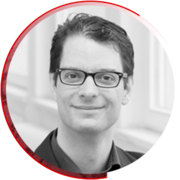
Brian R. Pauw
Federal Institute for Materials Research and Testing (BAM), Germany
Over the last 20 years working across institutes in Denmark, Japan, and Germany, Dr. Brian R. Pauw has continued to address methodological challenges in small-angle scattering as a “full-stack” X-ray scatterer. Collaborating with members of the community and other scientists, Brian’s work spans a broad range, including instrument design and adaptation; automated syntheses and simulations; measurement planning and automation strategies; comprehensive data corrections and analysis pipelines; and data organization and stewardship.
Happiest when solving challenges alongside friendly colleagues in a well-equipped laboratory, his work has appeared in over 50 publications, numerous presentations and lectures (some of which can be found on YouTube), and blog posts on his long-running SAXS weblog.

Uri Raviv
The Hebrew University of Jerusalem, Israel
Professor Uri Raviv joined the Institute of Chemistry at the Hebrew University of Jerusalem in 2006, after completing his postdoctoral research at the University of California, Santa Barbara, and earning his PhD at the Weizmann Institute of Science (2003). His lab develops pioneering X-ray scattering-based technology to resolve the structures and interactions of macromolecular assemblies in realistic solution conditions.
By applying state-of-the-art data analysis with simulations, theory, and various algorithms (e.g., maximum entropy optimization), the lab resolves the structures, intermolecular interactions, and assembly mechanisms of complex, weakly ordered, and dynamic self-assembling biological structures. It currently focuses on virus self-assembly, the assembly of cytoskeletal filamentous proteins and their associated proteins, and lipid membranes.

Bryan R. Wheaton
Corning Corporation
Dr. Bryan Wheaton is currently a principal scientist within the Characterization Sciences Directorate at Corning Incorporated in Painted Post, New York. He holds a BS in ceramic engineering and a PhD in glass science, both from Alfred University. He has worked at Corning for his entire 42-year professional career, holding various technical and functional roles in the characterization field.
Bryan served as the technical leader and supervisor of the X-ray diffraction laboratory for more than 25 years, where he was responsible for materials understanding through the development of characterization methods. He supported projects across both the science and technology, and business units. He was also the functional manager of a diverse group of 30 scientists and technicians in the fields of microscopy, surface science, and structure analysis techniques.
Bryan’s main technical focus has been the study of phase assemblage and microstructure in ceramic and glass-ceramic materials through the use of X-ray diffraction, scanning and transmission electron diffraction, and electron backscattered diffraction analysis.

Simon Billinge
Columbia University
Professor Simon Billinge has over 25 years of experience studying local structure in materials using X-ray, neutron, and electron diffraction. He has pioneered novel data analysis methods using graph-theoretic, artificial intelligence, and machine learning approaches. Simon earned his PhD in materials science and engineering from the University of Pennsylvania in 1992. Since 2008, he has been Professor of Materials Science and Applied Physics and Applied Mathematics at Columbia University.
The author of more than 350 papers, he is a fellow of the American Physical Society and the Neutron Scattering Society of America, a former Fulbright and Sloan fellow, and recipient of multiple awards, including the 2025 Gregori Aminoff Prize and the MRS Materials Characterization Award. In 2011, he was honored for contributions to the nation as an immigrant by the Carnegie Corporation of New York. He currently serves as Section Editor of Acta Crystallographica Section A: Advances and Foundations and regularly reviews major facilities and federally funded programs.
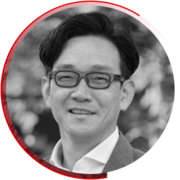
Noritaka Saito
Kyushu University
Professor Noritaka Saito, based at Kyushu University, is passionate about understanding high-temperature materials and developing innovative processes for the steel and ceramics industries. After earning his PhD in Engineering from Kyushu University, he joined the faculty in 2005 and spent time as a visiting professor at the University of California, Berkeley, in 2008. His research explores molten oxides, multiphase flow behavior, and advanced joining techniques for ultra-high-temperature ceramics.
The author of over 100 journal papers and an extensive number of conference presentations, as well as the holder of several patents, he actively bridges science and industry. Recognized with awards such as the Nishiyama Memorial Award and TMS Young Leader Award, he is currently focused on sustainable steelmaking, hydrogen-based processes, and AI-driven solutions for greener manufacturing.

Svetlana Mintova
LCS-CNRS, France
Dr. Svetlana Mintova is Director of Research of Exceptional Class at CNRS, Normandy University, and Head of the Centre for Zeolites and Nanoporous Materials. Her research focuses on porous materials, with expertise in zeolites. She has received numerous prestigious distinctions, including the Baron Axel Cronstedt Award (FEZA), Donald Breck Award (IZA), Flanigen Award (Honeywell UOP), and was named Knight of the National Order of Merit by the French president in 2025. She also carried the Olympic flame for Paris in 2024.
A former president of both IZA and FEZA, she currently serves as Associate Editor of Inorganic Chemistry Frontiers (RSC) and Editor of Microporous and Mesoporous Materials and Chemical Engineering Journal: Green and Sustainable (Elsevier).
Registration
The deadlines for abstract submission and early-bird registration have been extended!
Registration must be completed online. Individual registration is possible for SAXS excites or XRD excites, while combined registration is available at a reduced price.
All participants must be registered to attend the symposia.
In addition to attending talks by invited speakers, participants can submit an abstract to present their work orally or during the poster sessions. Abstract submission is available on the registration website.
The registration for each event includes meals, drinks and snacks, and coffee breaks with regional sweets.
Also included are the conference dinner, a Graz city tour, and bus transfers from Graz University of Technology to Anton Paar GmbH and back to the city center.
Accommodation will not be booked by the organizing committee. Please refer to the Graz tourism website to arrange your stay.
Registration deadline
- The deadline for abstract submission is Jan. 23, 2026.
- The early-bird registration ends on Jan. 16, 2026.
- The regular registration ends on Mar. 13, 2026
Participation fee
- Single fee: SAXS excites or XRD excites
- Universities, research centers, industry, non-profit organizations: 250 € (200 € with early-bird)
- Students, PhD candidates: 160 € (110 € with early-bird)
- Combined fee: SAXS excites and XRD excites
- Universities, research centers, industry, non-profit organizations: 350 € (300 € with early-bird)
- Students, PhD candidates: 200 € (150 € with early-bird)
Registration
Please click on the link below to be transferred to the third-party registration website (registration is handled through Eventbrite).
Location
The SAXS excites & XRD excites symposia will take place at Graz University of Technology, Institute of Chemistry, Stremayrgasse 9, 8010 Graz, Austria. All lectures and the poster sessions will be held there.
Graz, Austria’s second-largest city, is home to three universities, and is a bustling center of culture and higher learning. Just a short train ride from cities like Vienna and Salzburg, it is a great starting point from which to see the rest of Austria.
By airplane
Graz has an international airport, Flughafen Graz-Thalerhof, which can be reached via Frankfurt, Munich, Zurich, Amsterdam, and Vienna.
A train takes you from the airport to Graz’s main train station in about 10 minutes. Taxis are available at the departure gate as well.
By train
Graz’s main station is well-connected to the center and other parts of the city, and a number of buses and tramways take you downtown.
By car
- From Vienna (AT) via A2 in the direction of Graz. The distance is approx. 200 km and it will take you about two hours.
- From Munich (GER) via A8, A9. The distance is approx. 388 km and it will take you about 4.5 hours.
- From Maribor (SLO) via A9. The distance is approx. 68 km and it will take you about one hour.
- From Zürich (CH) via A96, A995. The distance is approx. 700 km and it will take you about eight hours.
Scientific committee
Bernhard Gadermaier, TU Graz (Austria)
Glen Smales, TU Graz (Austria)
Georg Pabst, University of Graz (Austria)
Barbara Puhr, Anton Paar GmbH (Austria)
Benedikt Schrode, Anton Paar GmbH (Austria)
Andreas Keilbach, Anton Paar GmbH (Austria)
Organizing committee
Monika Filzwieser, TU Graz (Austria)
Barbara Seibt, TU Graz (Austria)
Martin Lombaard, Anton Paar GmbH (Austria)
Marius Kremer, Anton Paar GmbH (Austria)
Heiner Santner, Anton Paar GmbH (Austria)
Previous SAXS excites & XRD excites events
XRD excites (2024)
The first international “XRD excites: Non-Ambient XRD & Beyond” symposium was held at Graz University of Technology from July 9-11, 2024. More than 90 participants from 20 countries discussed the latest research and expanded their networks.
Our previous XRD excites keynote speakers include:
- Claudia Weidenthaler (Max-Planck-Institute für Kohlenforschung)
- Monica Dapiaggi (Università degli Studi di Milano)
- David Walker (University of Warwick)
- Rémy Guillet Nicolas (CNRS LCS - ENSICAEN)
- Scott Misture (Alfred University)
- Volker Kahlenberg (University of Innsbruck)
- Stefan Weber (Abbvie Germany)
- Vishnu Shanker (NIT Warangal)
SAXS excites (2017, 2019, 2023)
The first three “SAXS excites” symposia were held in 2017, 2019, and 2023. Combined, they had over 200 participants from around the globe. With world-renowned keynote speakers, captivating talks, and engaging poster sessions, the events were a resounding success.
Our previous SAXS excites keynote speakers include:
- Jill Trewhella (University of Sydney)
- Karen Edler (Lund University)
- Denise Erb (Helmholtz-Zentrum Dresden-Rossendorf)
- Jan Ilavsky (Argonne National Laboratory)
- Dimitri Svergun (EMBL Hamburg)
- Mitsuhiro Shibayama (The University of Tokyo)
- Jan Skov Pedersen (Aarhus University)
- Detlef Smilgies (University of Binghamton)
- Sylvio Haas (DESY)
- Yongfeng Men (Changchun Institute of Applied Chemistry)
- Stefan Salentinig (University of Fribourg)
- Otto Glatter (University of Graz)
- Cy Jeffries (EMBL Hamburg)
- Stephan Roth (DESY)
- Michael Krumrey (PTB National Metrology Institute)



